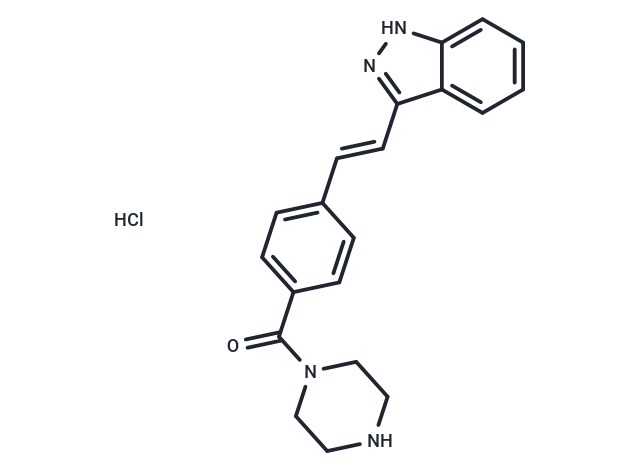Shopping Cart
- Remove All
 Your shopping cart is currently empty
Your shopping cart is currently empty

Tirbanibulin is an inhibitor of Src that targets the peptide substrate site of Src (GI50: 9-60 nM in cancer cell lines).

| Pack Size | Price | Availability | Quantity |
|---|---|---|---|
| 2 mg | $33 | 5 days |
| Description | Tirbanibulin is an inhibitor of Src that targets the peptide substrate site of Src (GI50: 9-60 nM in cancer cell lines). |
| Targets&IC50 | Src (HepG2):60 nM, Src (Hep3B):26 nM, Src (HuH-7):(GI50)9 nM, Src (PLC/PRF/5):13 nM |
| In vitro | Tirbanibulin (KX2-391) is found to inhibit certain leukemia cells that are resistant to current commercially available drugs, such as those derived from chronic leukemia cells with the T3151 mutation. KX2-391 displays steep dose-response curves against Huh7 (GI50=9 nM), PLC/PRF/5 (GI50=13 nM), Hep3B (GI50=26 nM), and HepG2 (GI50=60 nM), four hepatic cell cancer (HCC) cell lines[1]. Tirbanibulin is evaluated in engineered Src driven cell growth assays inNIH3T3/c-Src527F and SYF/c-Src527F cells and exhibits GI50 with 23 nM and 39 nM, respectively[2]. |
| In vivo | In pre-clinical animal models of cancer, Tirbanibulin (p.o.) is shown to inhibit primary tumor growth and to suppress metastasis[2]. |
| Alias | KX2-391 (dihydrochloride), KX-01 (dihydrochloride) |
| Molecular Weight | 504.45 |
| Formula | C26H31Cl2N3O3 |
| Cas No. | 1038395-65-1 |
| Relative Density. | no data available |
| Storage | Powder: -20°C for 3 years | In solvent: -80°C for 1 year | Shipping with blue ice. | ||||||||||||||||||||||||||||||
| Solubility Information | DMSO: 33.33 mg/mL (66.07 mM), Sonication is recommended. | ||||||||||||||||||||||||||||||
Solution Preparation Table | |||||||||||||||||||||||||||||||
DMSO
| |||||||||||||||||||||||||||||||

Copyright © 2015-2025 TargetMol Chemicals Inc. All Rights Reserved.